Have you ever eaten Doro Wat?
Doro wat is a stew dish beloved in Ethiopia.
Since it's especially edible at this time of year, I decided to introduce it this time.
Please watch until the very end!
Additionally, TasteTune introduces cuisines from around the world and releases music that expresses those dishes♪
Why not enjoy this article along with that music!
Our music is available on YouTube, Spotify, and other platforms!
What is a Doro Wat?
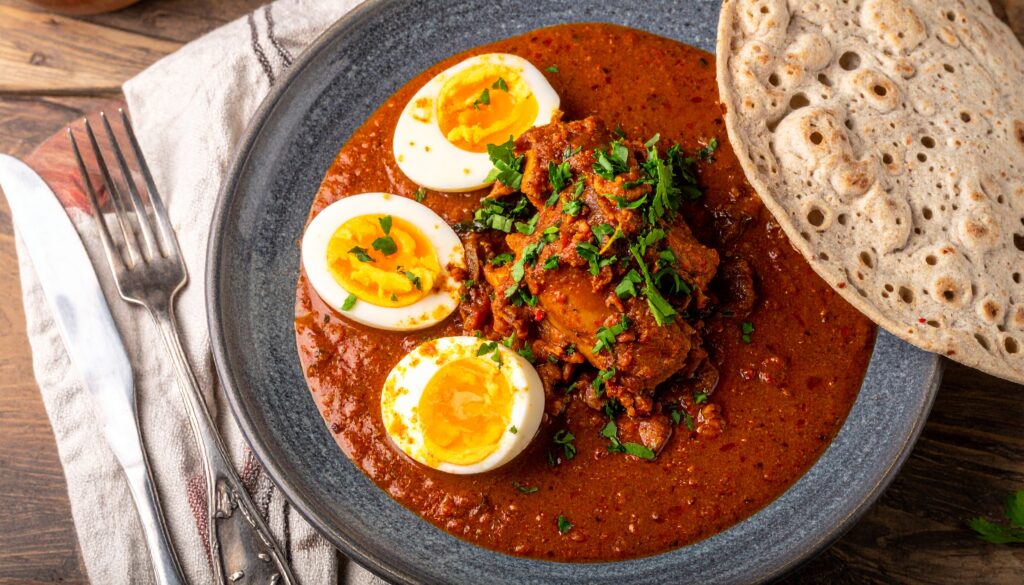
Doro Wat/Wot is, simply put, a chicken stew.
It is served on a large flatbread-like staple food called “injera” (a fermented teff flour crepe) and_ eaten together.
The traditional way to eat is to use injera to scoop up stew or other ingredients and bring them to your mouth.
This dish is made by simmering bone-in chicken and hard-boiled eggs in a sauce rich with spices and plenty of onions.
Its flavor is spicy and deeply complex.
The dish uses a seasoning blend called “Berbere,” a mixture of chili peppers and spices, offering a complex flavor profile with notes of heat, sweetness, and smokiness.
Additionally, the generous use of onions gives it a rich, savory flavor.
The result is a flavor that is spicy, deep, and punchy.
Additionally, the name originates from combining “Wat/Wot,” meaning stew or simmered dish, with “Doro,” meaning chicken.
TasteTune「Doro Wat」
Everyone, have you heard Tastetune's song “Doro Wat”?
This music draws inspiration from Doro Wat, expressing its warm, passionate flavor and Ethiopia's communal food culture through sound.
The soundscape woven from the resonance of traditional drums, hypnotic handclaps, and vivid horn melodies invites listeners into an Ethiopian celebration.
Please give it a listen!
Below, we introduce the thoughts, expressions, and creative approaches embodied in this musical work.
The Earth's Pulse and Rhythm of Passion
At the heart of this piece lies the powerful rhythm rooted in the Ethiopian soil.
The drumbeat, resonating as if stamping the earth, evokes the slow simmering of Doro Wat.
The rhythm of clapping reflects the joy shared around the table and the lively interaction among people.
It's as if the spices in the pot, heated by the flame, are passionately rising with their aroma, expressed through sound.
A composition where celebration and intimacy intertwine
The overall feeling conveyed by this piece is an atmosphere that is “as vibrant as a festival yet as intimate as a family gathering.”
The powerful rhythm and warm melody combine to naturally draw listeners into its world.
It is truly a soundscape that lets you experience the richness of Ethiopian culture and the joy born through food.
The allure of Doro Wat to savor with your ears
This piece of music themed around Doro Wat is not merely sound that flows by.
What you'll find there is the warmth of the food, the passion of the spices, and the joy of people sharing time together.
If you listen closely, you can almost see the scenes of Ethiopian dining tables and the smiles of its people spread out before your eyes.
Please surrender your heart to this journey of sound and fully savor the world that Doro Wat holds.
The History of Doro Wat
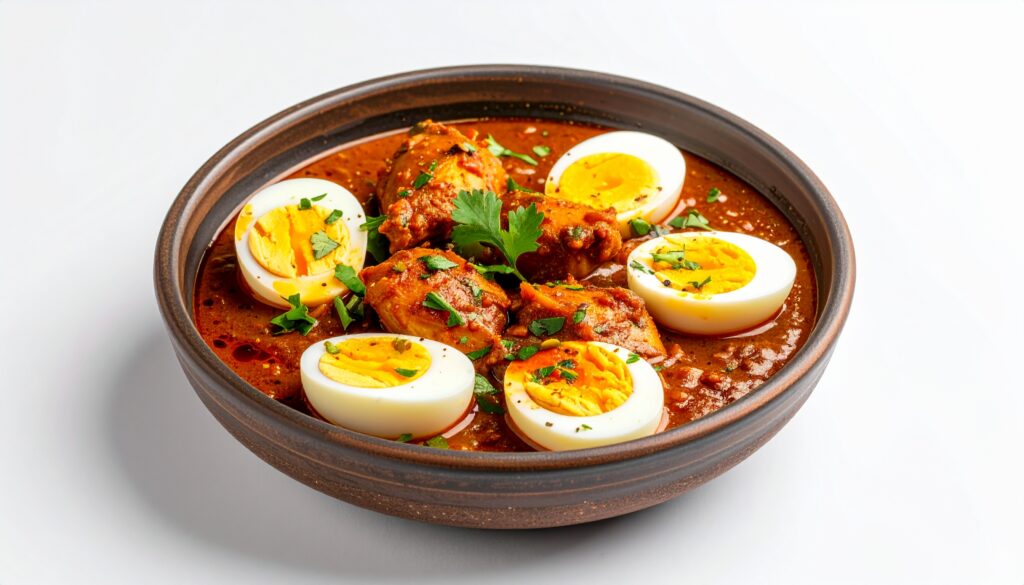
When did Doro Wat first start being made?
Actually, no clear records remain, so I cannot share them with you.
There is also no clear documentation regarding other wat that do not use chicken.
Therefore, little is known about their origins, and the current state of affairs is that we can only speculate.
However, some scholarly works note that during the Axumite Kingdom era, roughly from the 1st to the 7th century, there were customs involving the cultivation of grains (such as teff), fermented foods, and communal feasting during banquets and festivals, which served as precursors to the wat.
Assuming this is historical fact, Watt may have had a very long history, and Doro Wat may have emerged as one of its derivatives.
Furthermore, references to watts gradually increase in texts dating back to the 15th century and beyond.
And in modern times, watt-type foods have become established in both everyday meals and festive meals.
Various variations exist, establishing a cultural identity within the stewed dish genre.
The use of distinctive spices and oils is also thought to have been nearing completion by this period.
Doro Wat Trivia and Fun Facts
Enkutatash and Doro Wat

In the Ethiopian calendar, the New Year falls on September 11 (or September 12 if it precedes a leap year) in the Gregorian calendar.
On this day, it is traditional for family and friends to gather and hold a celebratory feast.
This New Year festival is called Enkutatash, a name meaning “gift of jewels.”
And one of the dishes that appears as part of that celebratory meal is the Wat-style dish.
Doro Wat is especially often included in banquet menus.
So why is the Doro Wat chosen among the wats for the New Year?
This is because the New Year carries a strong festive atmosphere, leading to a tendency to choose heavier, more special menus.
Doro Wat is a spice-based, slow-cooked stew with a cultural background that makes it suitable as a “special occasion dish.”
Furthermore, meals that embody hospitality and sharing are important, and Doro Wat fulfills that role.
Holidays and Doro Wat
Doro Wat is often served during Enkutatash and other festivals.
For example, during important feasts of the Ethiopian Orthodox Church, particularly Genna (Ethiopian Christmas, January 7th) and Fasika (Easter), Doro Wat is the dish placed at the center of the feast.
It is traditional to serve such hearty dishes once the fasting period ends.
Compatibility with Fermented Bread and Injera
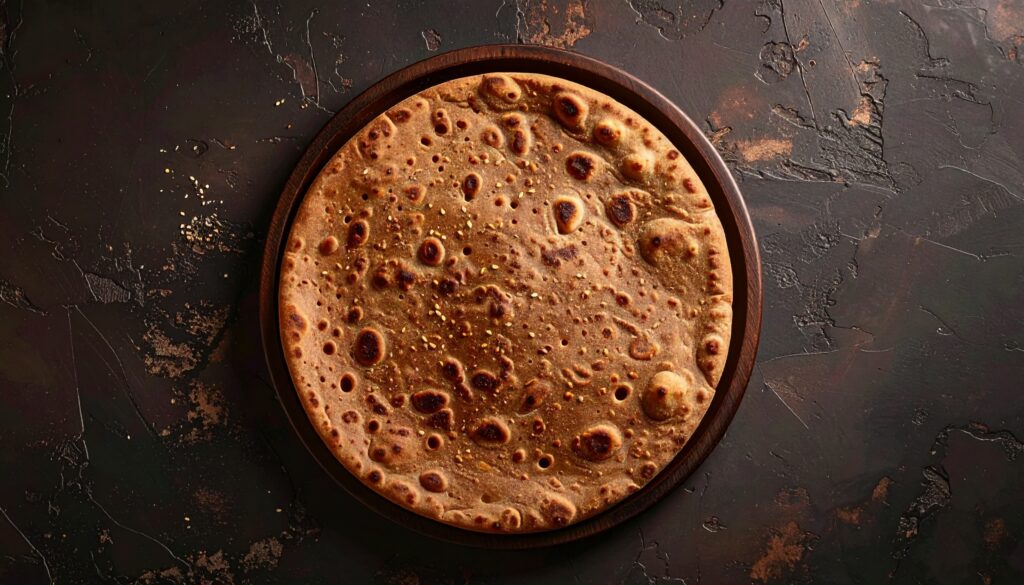
Injera is a bread made from teff, a grain cultivated in highlands since ancient times, through a fermentation process.
A large baking vessel called a “mitad” is used, and fermentation times also vary depending on the region and climate.
It serves both as a cooking utensil and tableware, and functions to scoop stewed dishes like Doro Wat.
Additionally, the sourness and texture of injera help balance the dish by counteracting the spiciness, richness, and heaviness of the fat.
Its status as a “national dish” and “symbolic food”
The combination of Doro Wat and injera represents Ethiopian cuisine.
It is introduced as one of the “national dishes,” deeply tied to cultural identity.
It is also said that Ethiopians living abroad (the diaspora) most often prepare and bring Doro Wat as one of the dishes to convey the taste of their homeland.
This has also increased the international recognition of Doro Wat.
Nutritional characteristics
Doro Wat is a satisfying dish rich in protein from the combination of chicken and eggs, and relatively high in fat.
When eaten with injera, it provides a balanced intake of carbohydrates, dietary fiber, and other nutrients.
However, depending on the amount of seasonings, spices, butter, or fat used, salt and saturated fat intake can become excessive, and recipes that adjust for this point are also seen in modern times.
How to Make Doro Wat
Ingredients (serves 4-6)
- Chicken (bone-in, cut into chunks) … approximately 1 kg
- Lemon juice … 2 tablespoons (for marinating the chicken)
- Salt ... appropriate amount
- Onions … 3 large (finely chopped)
- Nitel Kibbe (Ethiopian spiced butter) … 1/4 cup
※If unavailable, substitute with unsalted butter plus a small amount of ginger and garlic. - Garlic … 3–4 cloves (grated)
- Ginger … 1 tablespoon (grated)
- Berbere (Ethiopian spice mix) … 3 to 4 tablespoons
- Tomato paste … 2 to 3 tablespoons
- Chicken broth or water … about 2 cups
- Hard-boiled eggs … 4–6 (peeled)
- Black pepper … a pinch
Preparation
- Rub the chicken with lemon juice and salt, then let it sit for 20 to 30 minutes to remove any gamey smell.
- Prepare hard-boiled eggs and peel them.
Cooking Instruction
- Sauté the onions
Place onions in a heavy pot without oil and sauté over low to medium heat, allowing moisture to evaporate, for 30 to 40 minutes. Cook until golden brown without burning. - Add flavorings and spices
Add the minced meat to the onions, then add the garlic and ginger and sauté for a few more minutes.
Next, add the bell pepper and sauté until fragrant. - Add tomato paste
Add the tomato paste and stir to combine, then sauté until the mixture thickens into a rich paste. - Simmer chicken
Add the seasoned chicken and mix well to coat with the paste.
Pour in chicken broth (water is also acceptable) and simmer over low to medium heat for about 40 to 50 minutes. - Add boiled eggs
Add the boiled eggs to the stew and simmer for another 10 minutes.
Taste and adjust with salt and pepper.
Presentation
- In Ethiopian tradition, it is eaten with injera.
- In Japan, it goes well with rice or bread.
- The key points are to sauté the onions thoroughly and adjust the spiciness with the amount of berbere.
This brings it closer to the authentic flavor.
Summary
How was it?
This time, we introduced Ethiopia's national dish, Doro Wat!
The spicy stew and bread went together perfectly—it looked like such a delicious dish!
In Japan, it seems you can find it at Ethiopian restaurants or African restaurants.
There are recipes you can make at home, but I think this one is quite time-consuming and difficult to prepare.
However, I believe the sense of accomplishment when you finally taste it will be all the greater for it.
If you're feeling adventurous or love cooking, give this a try!
I'd be thrilled if reading this article sparked even a little interest in this dish for as many people as possible.
Thank you for reading to the end!
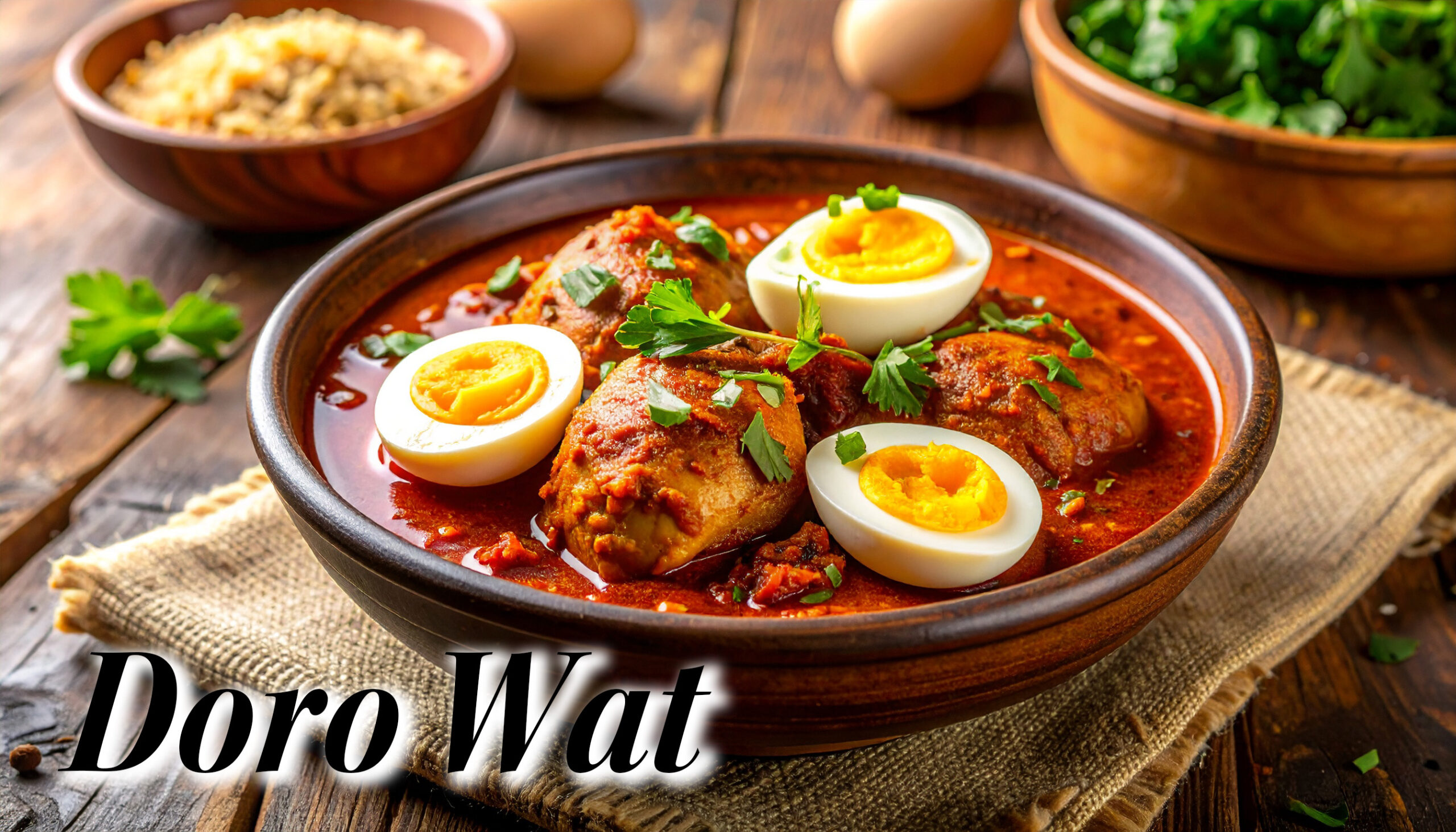
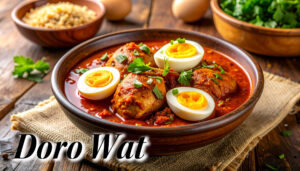


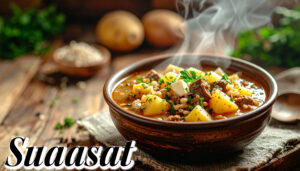

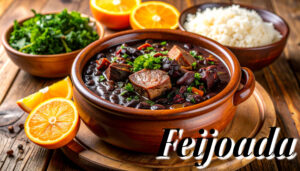

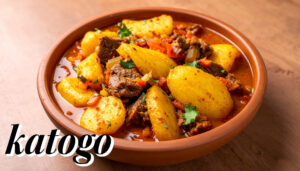
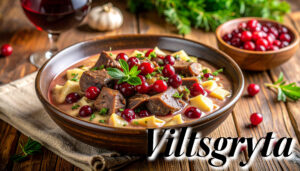
Comments